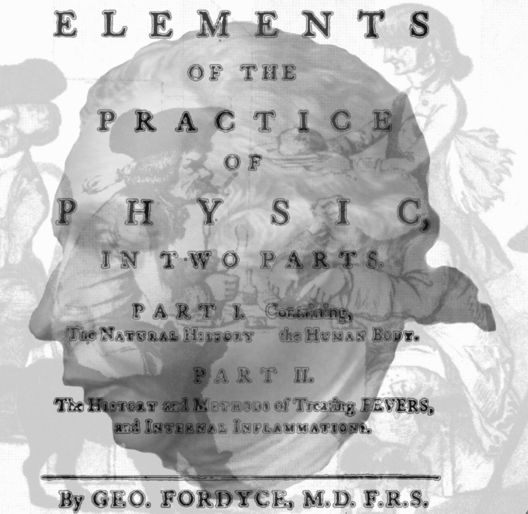George Fordyce1736–1802
Fordyce was among the Scotch doctors who travelled to London to make their mark. He was a founder (with John Hunter) of The Society for the Improvement of Medical and Chirurgical Knowledge in 1783. The initial membership of the Society was nine, and an upper limit of twelve was set. Fordyce not only assisted in establishing the Society but he “continued to attend its meetings most punctually till within a month or two of his death”. Fordyce was a remarkable man. He was born in Aberdeen, obtained his medical degree from Edinburgh (receiving instruction from Cullen), and moved to London in 1759. From 1770 he worked as physician, then senior physician, at St. Thomas’s Hospital. Despite the lack of an English degree and his disputes with the College of Physicians he was elected Fellow in 1787. This was largely because his knowledge of pharmaceutical chemistry outstripped that of the other Fellows, who were preparing a new edition of their Pharmacopœia. Fordyce became a member of the Literary Club, founded by Joshua Reynolds and Samuel Johnson (who seconded Fordyce’s proposal). The Club held its meetings at the London Coffee House. Fordyce’s dress sense appealed to Johnson, as did his eating habits. He ate one meal a day, but it was on a gargantuan scale. Each day, at 4 pm, Fordyce would take his seat at Dolly’s chophouse, in Paternoster-row. There he would be brought a tankard of strong ale, a bottle of port, and a quarter pint of brandy. Upon his arrival the cook would place a pound and a half rump steak on the gridiron, and some trifles, like half a boiled chicken or a plate of fish, would be served until the steak was ready. Fordyce established a medical school in London, and would deliver three hours of medical lectures daily, from 7 in the morning, and without notes. His visits to the few patients he had were noted for their brevity, and he never lost his Scotch tongue. He wrote on digestion, fever, and chemistry, and delivered a Bakerian and a Croonian lecture to the Royal Society, of which he was a Fellow. Fordyce also gave the Harveian oration to the Royal College of Physicians of London in 1791. He commenced lecturing on chemistry shortly after his arrival in London, and added ‘Materia Medica and the practice of physick’ to these five years later. It was in his textbook on medicine that he related phantom sensations to the normal functioning of the nervous system: “The sensibility depends entirely on a part’s being connected with the brain by the nerves; for, If the nerves be going to any part be cut through, the sensibility is lost. If the nerves going to any part be moderately comprest, the sensibility is diminished. If the nerves be comprest strongly, the sensibility is lost. If the pressure be soon removed, the sensibility recurs. If the pressure be continued for a long time before it is removed, the sensibility returns more slowly, or not at all. Pressure on the brain, diminishes the sensibility of the whole body. If a small branch of nerve be cut through, so as to take off the sensibility of a part of the skin, it may be restored in time. The sensibility may be impaired, or lost, without any sensible pressure on the nerve, or alteration of its structure. When there is no wound in the body, the sensations appear to be in the place where the application exciting them is made. If an extremity be cut off, an application made to the stump, may produce sensations which appear to be in the part amputated”. Fordyce is shown combined with the title page of his Elements of the Practice of Physic and also an illustration of an eighteenth century London chop house.
